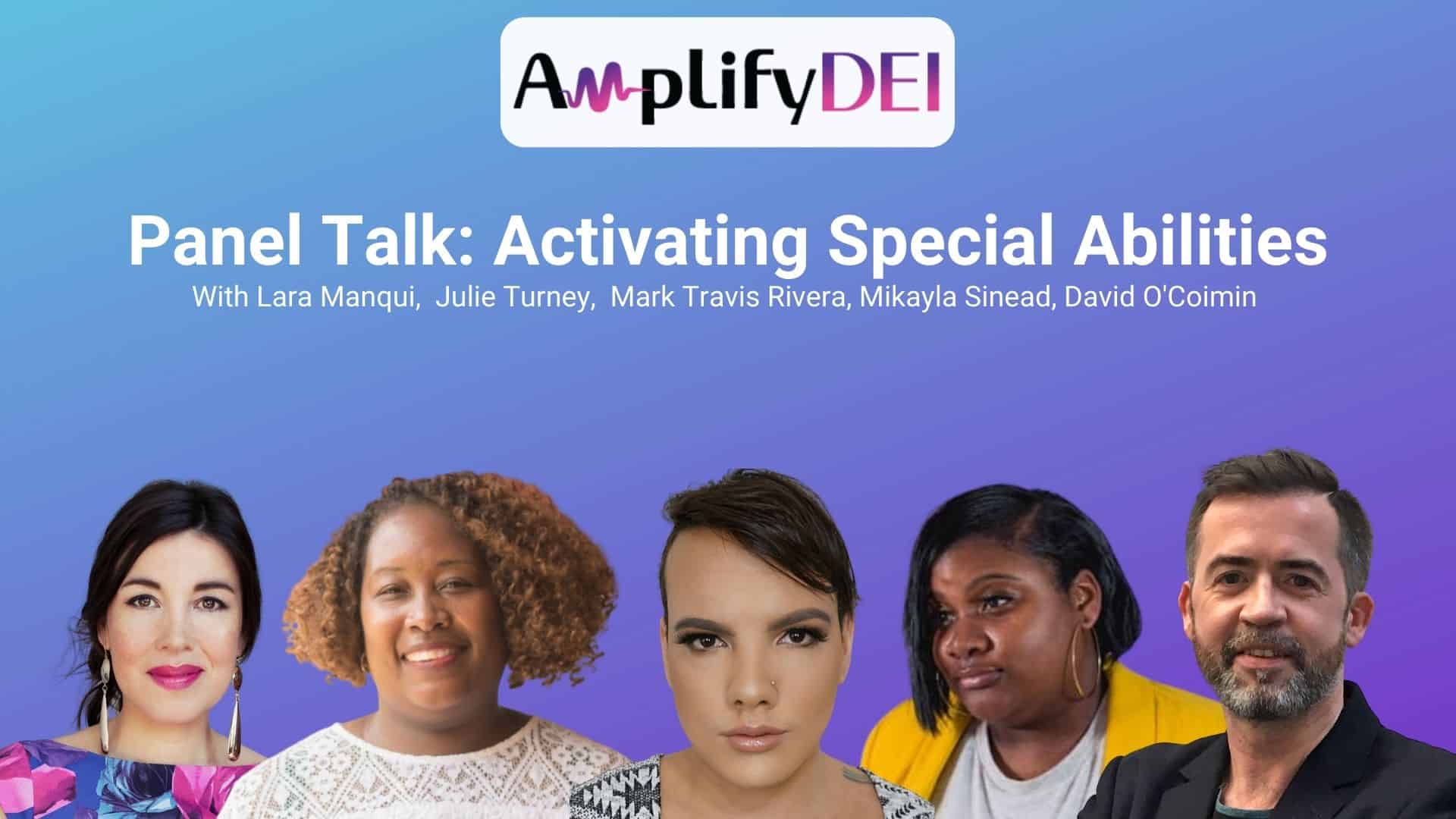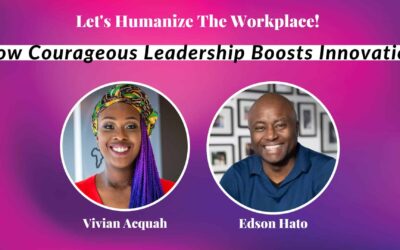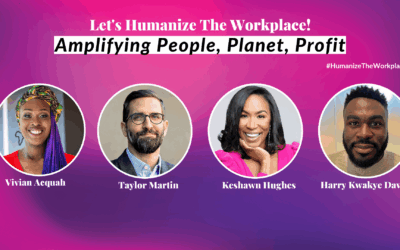Let’s start out with a cliché: we are all unique. We know this! Each of us is unique in a variety of ways. We each have strengths and abilities that set us apart from everyone else—we each have our own superpowers.
Disclosure: This post contains affiliate links. If you click through and make a purchase, I’ll earn a commission, at no additional cost to you.
Special Abilities
And while we all have superpowers, not all of us have learned what they are and activated them. There are those special abilities that lie dormant until we activate them and live as our authentic selves. This article recaps one of the Amplify DEI Conference panel discussions that looked specifically at how to do just that. The panel focused on some specific special abilities, those that come through neurodiversity.
Before getting more into neurodiversity and activating special abilities in the workplace, let’s introduce the panelists.
- Mikayla Sinead from Bridge Network Group Ltd
- Mark Travis Rivera, Storyteller and DEI Consultant
- David O’Coimin, Founder & CEO of Nook Workplace Wellness Pods
- Julie Turney, HRforHR Coach
- Lara Manqui, Growth Coach for Female Technologists and Social Justice Champion.
This panel discussion covered a lot of ground. They looked at what we mean by special abilities, how to include and embrace employees with neurodiversity, and what leaders can do to activate other people’s superpowers.
Embrace your special abilities
This panel discussion was about activating special abilities. So, what are they? Panel host, Lara Manqui, started by sharing that she initially thought the conversation would be exclusively about neurodiversity. And while there is a lot to say about people with neurodiversity—those with autism, ADHD, dyslexia, or other similar experiences—it is so much broader than that.
The goal of activating special abilities is for each person to unlock their potential and live authentically as themselves. Panelist Mark Travis Rivera shared aspects of his identity as a Latinx, disabled, queer, and gender non-conforming man. Living authentically as all of those things is his superpower. In the same way, each of us has unique aspects of our identity that empower us to live in our strengths and impact the world around us.
Embracing your identity and who you are is made possible by making a daily choice to do so. But it can be challenging. We’ll look at how employers and leaders can help with this, but it starts first with the individual. Here are some of the themes and encouragements that the panel discussed:
- Authenticity is a daily choice. You need to choose over and over again to live in full expression of who you are. It doesn’t happen overnight; authenticity is a process to learn and choose to embrace daily.
- Be curious about yourself. A question came up during the panel—what if I don’t know that I’m neurodivergent? The panelists agreed that starting from a place of curiosity is the best place to start. If you feel like you are different or don’t quite “belong,” there may be a reason for that. Get curious about yourself and do the work to learn more about who you are.
- Learn to express your wants, needs, and boundaries. Of course, this is easier said than done, but with practice, it becomes easier. To live as your whole, authentic self, you need to be able to hold boundaries around what is essential for you to be healthy and productive.
“When you learn to embrace all of yourself, you unlock your potential for professional success.
It wasn’t until I found my voice, and embraced my full self, that my career took off that I started to make an impact…
And I tell people, authenticity is a daily choice.”
-Mark Travis Rivera
Supporting neurodiversity in the workplace
The panel discussed some of the specific challenges that people with neurodiversity may have, specifically those with autism. Many people with autism find the workplace to be a challenging environment. They may struggle with being brutally honest or how to fit in with the social norms of a workplace. Individuals with neurodiversity see the world very differently, so it can be challenging to go for an interview and work at a new job.
And yet, people with neurodiversity are underrepresented in so many workplaces. And it is to the detriment of many companies that are losing out on this community’s unique, diverse perspectives. Panelist Julie Turney shared a quote, “Whatever is missing, what you need in your organization to take you to the next level, is sitting in the bodies that you are not filling.”
Too often, these are the bodies of individuals with neurodiversity. However, if companies take steps to make individuals with neurodiversity feel comfortable, they can tap into the amazing creativity and innovation that they bring. Here are some of the ideas from the panel on how to address challenges that individuals with neurodiversity face in the workplace:
- Be clear in your support. Explicitly make it known that your company does not discriminate against people with disabilities. Include language that shows accommodations can be made, and you are always welcome to discuss your needs with management.
- Consult with neurodivergent people to make accommodations. Part of bridging the gap is seeking out knowledge. If we know that interviews can be challenging for neurodivergent individuals, seek a consultant who can help modify your interview style. Or consult with the neurodivergent community on accommodations that can be offered to support prospective and current employees.
- Care about the physical space. Panelist David O’Coimin is an advocate for creating safe, accommodating space for employees and shared just how important it is. In his words, “inclusivity is about choice,” and there should be a choice in the physical environment. Small things like being able to control the lighting, going somewhere quiet (or loud, depending on your needs), and ensuring all spots are 100% accessible, including bathrooms, make a huge difference to employees. It signals care and value and that it is an accepting, safe space for all people.
“Space to me is the canvas on which we paint our lives. Architects often think about the buildings and the bricks and mortar, but I think about the people who use them and how those spaces either oppress or, hopefully, empower. And with that empowerment, things can unlock a superpower. It can also give people permission to bring themselves to the table.”
-David O’Coimin
Activating other people’s superpowers
Beyond the accommodations that need to be made for employees with neurodiversity, there are steps that organizations and leaders can do to activate everyone’s superpowers. For example, creating a safe place for employees allows them to be authentic and express who they are. In turn, an employer will reap the benefits of a healthy, engaged, and enthusiastic employee.
So, what can leaders do to activate the superpowers of their employees? Our panelists had a few ideas:
- Allow people time to explore. Learning about yourself is an ongoing process and can take time. A leader can create space for people to talk, share their stories, and learn more about themselves in the process.
- Lead by example. If you are authentic as a leader, you give others permission to do so as well.
- Be consistent and follow through on your promises. Panelist Mikayla Sinead shared how important it is for employers to be consistent. She said, “Don’t say it on a special day, a special week, a special month, and then do nothing. I want to see what you’re doing when the eyes aren’t on you.”
- Respect your employees’ needs and boundaries. For example, if they are unable to do something or need specific accommodations, show respect for that to cultivate deeper trust and understanding.
- Stay curious. Ask questions in order to learn more about an employee. Then, go away and do more research on your own and educate yourself. This is important because it gives them space without imposing on them to teach you all about their unique needs.
“Unapologetically shine in your own superpower to show people how to show in this. It’s not about dimming your light… Stand in full glory of you and encourage those to step up into to take that exact stance in themselves as well. Shine in your superpower, and then support those to do to do the very same.”
-Mikayla Sinead
Conclusion
Neurodiversity is a superpower. Being authentic who you are is a superpower. Helping others activate their special abilities is a superpower. This conversation with our panelists highlighted both why and how we could activate special abilities in the workplace. It’s too important to brush to the side—if we ignore it, there is untapped human potential, creativity, and innovation that workplaces are missing out on.
Head on over to Amplify DEI if you want to hear the full panel discussion or any of the other talks from Amplify DEI Conference. Amplify DEI is almost like the Netflix of DEI—a place to encourage, educate, and learn from one another to make DEI the forefront of every workplace.
Latest Posts
- How To Embrace Intersectionality in the Workplace
- 5 Essential Ingredients to Amplify Inclusive Leadership
- PRIDE in Practice: How and Why to Embrace Diversity, Equity, and Inclusion in the Workplace
- Let’s Talk About Racism In The Workplace Today
- Activate Inclusion From Within Your Comfort Zone With LinkedIn Now







